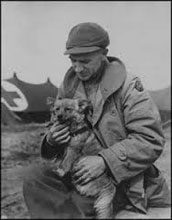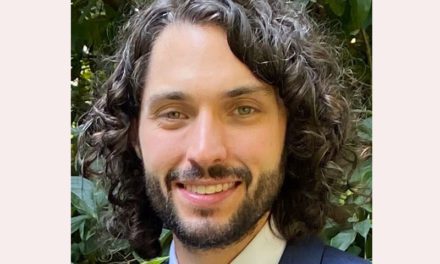 “Another story concerns a masterful piece of wartime understatement by one of our truck drivers, Private Carl Vonhorn, of Cooperstown, New York. He had pulled into an apple orchard adjoining ours the night before, parked his truck in the darkness, spread his blankets on the ground in front of the truck, and gone to sleep.
“Another story concerns a masterful piece of wartime understatement by one of our truck drivers, Private Carl Vonhorn, of Cooperstown, New York. He had pulled into an apple orchard adjoining ours the night before, parked his truck in the darkness, spread his blankets on the ground in front of the truck, and gone to sleep.
When he woke up at daylight, Vonhorn looked about him sleepily. And there on the ground right beside him, within arm’s reach, was a dead German soldier. On the other side of him, equally close, were two potato mashers ([German] hand grenades). Private Vonhorn got up very quickly. Later he was telling his officers about his startling experience, and he ended his description with this philosophical remark: ‘It was very distasteful.’ Everybody thought that was so funny it spread around the camp like fire, and the phrase ‘It’s very distasteful’ became practically a byword.”
Ernie Pyle, Brave Men (2001, University of Nebraska Press)
The phenomenal war correspondent Ernie Pyle wrote about Vonhorn in France not long after D-Day in 1944. As I searched for an illustrative opening quote for this column, I felt like a kid trying to pick out one special gumdrop from a 5-gallon jar of them in an old-fashioned candy store, the kind we had when I was growing up in the 50’s. It was nearly impossible. Pyle was that good.
I was under the weather recently and for many days could barely get off the couch. At one point I tried to be a good soldier and limped 40 feet to log onto Amazon. Having read Pyle quotes for years, it was time to see about his books. Though he died at the front in Japan in 1945, his books are readily available and I ordered everything in sight. Two days later they arrived in a pile. Yes, a pile of Pyles. Day after day I read them and quickly agreed that this Pulitzer Prize winner was no fluke, no grenade flash in the pan. He was the real deal: strong, direct, relentless. A talented writer to begin with who embodied a ceaseless quest for veracity in his wartime travels. He started his war coverage in London during the abominable Blitz and then embedded with front line troops in North Africa, Italy, and then Europe again before being fatally shot in Japan. He was 44.
Ernie Pyle was a force of nature, a human pile driver. Since he frequently drove around by Jeep, he was literally a human Pyle driver. Not just any war correspondent, he was deeply thoughtful, and while often troubled if not miserable, he became one of the world’s leading columnists. A man of the people always, he mixed with everyday foot soldiers – often in ghastly conditions – up to generals. His incessant travels also took him from posh London hotels to Scotland’s home fires to endless muddy foxholes and dugouts, where he made friends perhaps more readily than anywhere else. One suspects that those fortunate enough to meet him while under fire, to eat cold rations with him and sleep nearby, rarely forgot him.
As I began to feel better I began to thank my medical team and Mr. Pyle alike. I actually began to think of him as the uncle I never had and would have given anything to have him drop in from the grave for a chat. A brave (not fearless) reporter, bound to the facts and bound to tell them with a poet’s sensibilities, a pile driver relentlessly pounding the dirt and muck in search of the ground level truth about that horrible all-encompassing war that affected nearly everyone in some way while killing 60 million people and countless animals.
Where are the contemporary Ernie Pyles, I wondered. Where are the journalists, politicians, business leaders and everyday citizens who emulate Pyle? As for journalists, we seemingly lack anyone as universally trusted as CBS’s Walter Cronkite or Edward R. Murrow, both war correspondents, though there are many superb journalists working today. Sebastian Junger, Diane Sawyer, Richard Engel and Lara Logan come to mind among others.
As for politicians, we are blessed with only a handful of pile drivers – in the best sense of the term – today. Far more can be found among the ranks of our military and intelligence services with whom they coordinate. But if we ever needed pile drivers among politicians’ collective ranks it is now.
I criticized our current president when he was a candidate and will not repeat those sentiments at length now. I believed that his total lack of appropriate political or military background (he doesn’t even read books) combined with his outlandish egotism, self-aggrandizing, impulsiveness, constant operation in a fact-free zone and blatant narcissism made him wholly unqualified for the office of president.
I’m far from alone on this. His approval ratings have dropped below 40%, an historic low. Tony Schwartz, who co-wrote ‘The Art of the Deal’ with the president, wrote recently in the Washington Post: “Early on, I recognized that Trump’s sense of self-worth is forever at risk. When he feels aggrieved, he reacts impulsively and defensively, constructing a self-justifying story that doesn’t depend on facts and always directs the blame to others.”
To his credit, he at least now admits that the job is harder than he thought, the issues more complex than he previously believed. Gee, no kidding.
Investigating his campaign’s potentially criminal ties to Russia’s interference in our election has now been assigned to former FBI chief Robert Mueller. The president, no surprise, thinks he is the subject of a ‘witch hunt’ and unprecedented unfairness. The good news is that Mueller, 72, is a widely respected pile driver - again, in the best sense. He led the FBI longer than anyone else except Hoover. He served admirably in the U.S. Marine Corps during the Viet Nam war, leading a rifle platoon. He received the Bronze Star, the Purple Heart, and two Commendation Medals plus the Vietnamese Cross of Gallantry.
I hope fervently that Mr. Mueller slams this new assignment and our country can get back on track, back to the exalted leadership status that Ernie Pyle’s generation fought so fiercely to preserve. This hope is helping me to feel more optimistic about all of our futures as Americans. Helping my peace of mind and, frankly, my health.
Mueller and his team will need, ultimately, all of our support. We do breathe the same democratic air and overwhelmingly share the same American values. This is no time for infighting. It is time for facts, frankness, fairness. And progress. If I may conclude with more from Ernie Pyle’s Brave Men, it is with the fondest wish that his generation may live on, in spirit and in perpetuity.
“They seemed terribly pathetic to me. They weren’t warriors. They were American boys who by mere chance of fate had wound up with guns in their hands, sneaking up a death-laden street in a strange and shattered city in a faraway country in a driving rain. They were afraid, but it was beyond their power to quit. They had no choice. They were good boys. I talked with them all afternoon as we sneaked slowly forward along the mysterious and rubbled streets, and I know they were good boys. And even though they weren’t warriors born to the kill, they won their battles. That’s the point.”
Amen, Uncle Ernie. And thanks a million.







